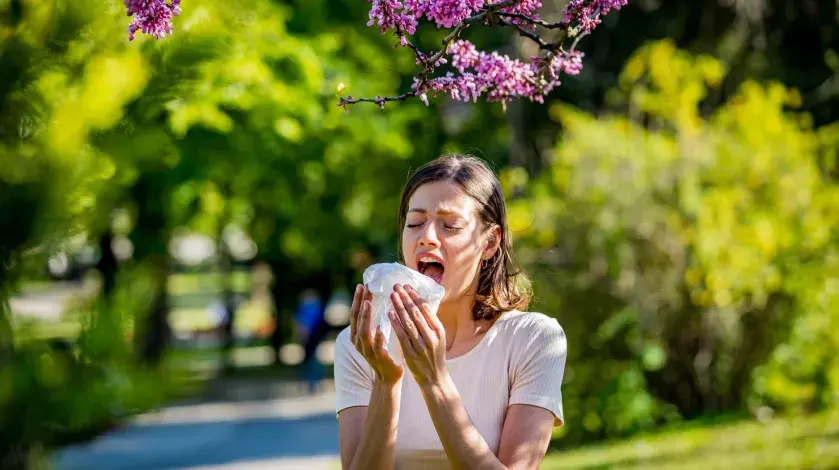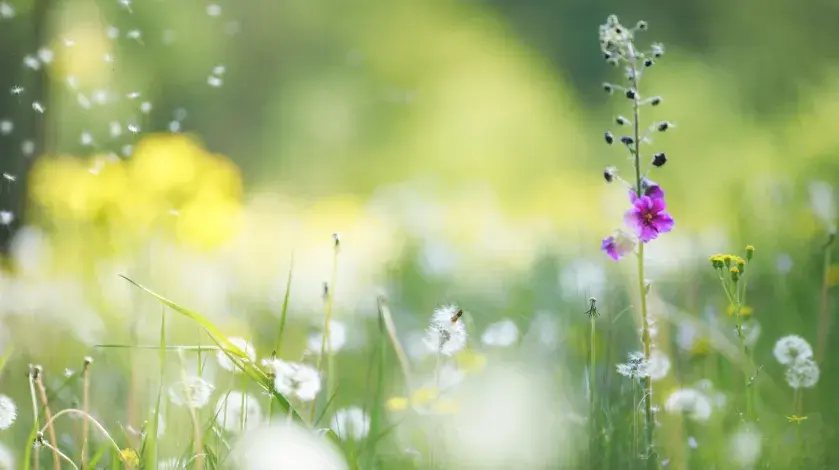Six Ways to Alleviate Seasonal Allergies
Author

Todd Ellerin, MD, Director of Infectious Disease
Spring is here and the budding plants, trees and flowers will soon be in full bloom.
So too will the seasonal allergies that affect an estimated 81 million Americans.
According to the Centers for Disease Control and Prevention (CDC), about one quarter (25.7%) of U.S. adults and 1 in 5 children have seasonal allergies.
Known medically as allergic rhinitis, seasonal allergies are an immune system response to pollen, dust, pet dander and other allergens and are most common during the spring and fall when plant (tree, grass and weed) pollen levels are highest.
Allergy symptoms can include sneezing, coughing, congestion or runny nose, and itchy or watery eyes.
More than just a seasonal nuisance, allergic rhinitis can lead to more serious health problems by triggering or worsening asthma symptoms and causing sinus and ear infections.
With environmental factors such as climate change extending allergy season and increasing pollen levels, more people are feeling the effects of seasonal allergies.
But there are things you can do to alleviate symptoms. Allergy specialists recommend these tips to suppress seasonal allergies.
Treat allergy symptoms with over-the-counter (OTC) medications
- The most effective way to use allergy medications is to start them several weeks before the allergy season begins as a preventative strategy and for best results.
- Oral antihistamines like Claritin, Zyrtec, Xyzal and Allegra can relieve runny or stuffy nose, sneezing and itchy or watery eyes.
- Oral decongestants such as Sudafed help with nasal congestion and medications that combine a decongestant with an antihistamine (Zyrtec-D 12 Hour, Claritin-D, Allegra D) can also relieve a stuffy nose.
- Corticosteroid nasal sprays (Flonase, Rhinocort, Nasonex, and Nasacort) can relieve nasal symptoms through their anti-inflammatory effect, while Astepro and cromolyn sodium nasal sprays block the release of histamines and other allergic mediators that cause symptoms.
- Allergy eye drops (Zaditor, Alaway, Pataday, Lastacaft) relieve itchy, watery or puffy eyes.
- Rinsing the sinuses (nasal irrigation) with a saline solution to remove mucus and allergens can also ease nasal congestion.
Limit your exposure to allergens
- Avoid gardening, lawn mowing, weeding and other yardwork, which can stir up allergens.
- Wear a facemask and protective goggles while doing outdoor chores.
- Skip outdoor activities in the early morning when pollen counts are highest.
Leave pollen outdoors
- Remove and wash clothing worn outside, and shower regularly to clean pollen from hair and skin.
- Don’t hang laundry outside to dry, as pollen can coat clothing, towels and bedding.
- Close windows and doors to keep allergens out.
- Keep pets that go outdoors bathed/groomed during pollen season.
Check the weather forecast or pollen count apps for levels in your area
- If pollen counts are elevated in your area, take allergy medications before heading outdoors.
- Stay indoors when conditions are windy and dry and pollen levels are high.
- The best time to go outside is following a heavy rain, which clears pollen/allergens from the air.
Keep indoor air clean
- Use air conditioning inside your home and car.
- Use high-efficiency particulate air (HEPA) filters for air heating and cooling systems, changing them regularly.
- Use a portable HEPA purifier in your bedroom.
- Use a vacuum with a HEPA filter to clean floors and rugs.
Ask your health care provider about consulting an allergist for additional treatment options
- If OTC medications are not effective in relieving your allergies, an allergist can perform skin or blood tests to determine the specific allergens causing your symptoms, strategies to avoid them, and the treatments that will work best for you.
- Allergen immunotherapy (allergy vaccine/shots) is another treatment option for people with severe seasonal allergies. Allergy shots are regular injections that contain small amounts of the substances causing the allergies, which over time can make you immune to them.
Todd B. Ellerin, MD is Director of Infectious Disease and Vice Chair of Medicine at South Shore Health.
Michael C. Young, MD is Associate Clinical Professor of Pediatrics, Harvard Medical School, Attending Physician, Boston Children's Hospital Allergy Program, Allergy/Immunology consultant for South Shore Hospital and practices at South Shore Allergy & Asthma Specialists in South Weymouth.
Author

Todd Ellerin, MD, Director of Infectious Disease








